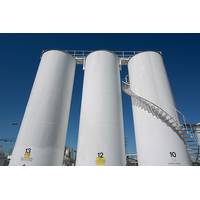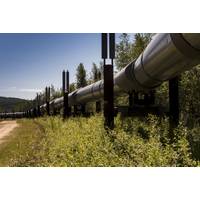US oilfield service firms prepare for earnings as tariffs cloud the outlook

The results next week should provide an insight into how the top three oilfield service companies in the world are dealing with the uncertainty caused by the U.S. trade tariffs and the recent drop in oil prices. Donald Trump campaigned on the slogan "drill, baby, drill" to increase U.S. production of oil and gas. However his extensive levies have fueled an international trade war and raised concerns about demand destruction. Brent crude is hovering around $66.65 per barrel.
US oilfield service firms prepare for earnings to be affected by tariffs

The results next week should provide an insight into how the top three oilfield service companies in the world are dealing with the uncertainty caused by the U.S. trade tariffs and the recent drop in oil prices. Donald Trump campaigned on the slogan "drill, baby drill" to increase U.S. production of oil and gas. However, his extensive levies sparked a global trading war and raised concerns about demand destruction. Brent crude is hovering around $66.65 per barrel.
BNP Paribas Funds to exclude new Oil and Gas Bonds
BNP Paribas Asset Management has announced that it will no longer be investing in new bonds issued in November by companies engaged in oil and natural gas exploration and production. According to the document, French asset managers said their policy was to help oil and gas companies transition to sustainable sources of energy, while screening those companies that are not adapting fast enough. The company will no longer purchase new bonds from oil and gas companies including diversified ones…
Investors flock to US dividend ETFs after Fed rate cut
Since the Federal Reserve began its rate-cutting cycle last month, U.S. ETFs that invest in dividend paying stocks have seen a surge of inflows. However, a rise in U.S. Treasury rates could slow down the inflow of funds. Morningstar's group of 135 U.S. Dividend ETFs tracked in September brought in $3.05 Billion, the same month that the Fed cut rates by 50 basis point, its first decrease since 2020. This compares with average monthly inflows in 2024 of $424 millions.
Investors on Board as U.S. Oil Majors Dismiss Wind and Solar Projects

Top U.S. oil firms are doubling down on drilling, deepening a divide with European rivals on the outlook for renewables, and winning support from big investors who do not expect the stateside companies to invest in wind and solar. Among a dozen U.S. fund managers contacted by Reuters from companies overseeing about $7 trillion in assets, most said they prefer oil firms to generate returns from businesses they know best and give shareholders cash to make their own renewable bets. With oil and gas prices jumping this year, the U.S.
US Buyers Turn to Offshore Crude

U.S. sanctions on Venezuela's oil industry have made winners out of Royal Dutch Shell Plc and BP Plc, Gulf of Mexico offshore heavyweights, as refiners in need of substitutes are scooping up oil produced in the region.Those two companies produce notable amounts of crude oil that refiners have settled on as the immediate replacement for the heavy Venezuelan crude that U.S. refiners relied on for years. Trading volumes in these grades of oil have surged to the highest in months, and prices touched five-year peaks after sanctions were imposed.U.S.
US Oil Export Boom Sparks Battle to Build Texas Ports

Booming U.S. oil exports have set off a scramble to build Gulf Coast ports to handle more than 3 million barrels per day in new supplies expected over the next five years.Of seven proposed oil-export projects, nowhere is the opportunity greater or the competition more fierce than in Corpus Christi, Texas, where three firms are vying to open the state's first deepwater port.Commodities trader Trafigura has taken an early lead with a planned…
US Judge Halts Keystone XL Oil Pipeline

A U.S. judge in Montana has halted construction of the Keystone XL pipeline designed to carry heavy crude oil from Canada to the United States, drawing a sharp rebuke on Friday from President Donald Trump.The ruling of a U.S. Court in Montana late on Thursday dealt a major setback to TransCanada Corp, whose stock dropped 2 percent in Toronto. Shares of companies that would ship oil on the pipeline also fell.TransCanada said in a statement it remains committed to building the $8 billion…
Saudi Arabia Limits US Crude Shipments, Iraq Steps In

Saudi Arabia's efforts to reduce a worldwide crude supply glut by cutting shipments to the United States means others are now filling in, most notably Iraq, in a trend that is set to accelerate in coming months. Over the summer, normally one of the busiest periods for crude shipments, U.S. imports of crude from Iraq rose by 41 percent from a year ago, while similar shipments from Saudi Arabia have dropped by 22 percent. That trend has continued…
Demand to Ship Gasoline on Top US Pipeline at 6-yr Low

The operator of the biggest U.S. fuel pipeline system said on Thursday demand to transport gasoline to the country's populous northeast is the weakest in six years, the latest symptom of a global oil market grappling with oversupply. Summer is typically when gasoline demand peaks in the world's biggest oil consuming country as motorists hit the road for vacation, and keeping their gas tanks full strains the capacity of U.S. refiners and pipelines.
US Crude Sails to Asia as OPEC Weighs More Cuts

Oil tankers carrying around 10 million barrels of U.S. crude are en route to Asia, according to shipping data and trade sources, as U.S. producers take advantage of favorable prices to ship to the region while OPEC ponders further supply cuts next week. At least eight tankers are in transit, sources said and the shipping data in Thomson Reuters Eikon showed, with one of them carrying the first ever cargo of Southern Green Canyon crude purchased by Japanese refiner Cosmo Energy.
East Coast Refiners Mull Texas Oil as North Dakota Alternative
U.S. East Coast refiners are looking to buy increasing volumes of domestic crude oil from the Gulf Coast, two sources said, the latest twist in a trade flow upheaval in the wake of the opening of the Dakota Access pipeline. Major U.S. East Coast refiners profited from railing hundreds of thousands of barrels of discounted Bakken crude to their plants daily from 2013 until 2015. But as more and more pipelines were built in North Dakota, the discount began to disappear, and so did the rail cars.
As Texas Output Surges, Cash Discounts Soar
Surging West Texas oil production has pushed the value of the region's spot crude to its lowest discount to the U.S. oil benchmark in nearly two years, as an exuberant shale industry pumps more to take advantage of higher prices and demand from refiners who have seen supplies cut by top global producers. OPEC and non-OPEC suppliers are working toward cuts of 1.8 million barrels per day, around 2 percent of the 92 million bpd global market, as they try to bring down record oil inventories and raise prices.
Energy pipelines back in investor favor after Trump orders
Investors have rushed back into North American pipelines after U.S. President Donald Trump revived growth prospects in a sector that struggled to cope with a two-year oil price slump and strident opposition from environmental and Native American activists. Investor confidence in the industry was shaken last year when the administration of former President Barack Obama halted the $3.8 billion Dakota Access Pipeline, just as Energy Transfer Partners had nearly finished building it.
U.S. Refiners Cash in on Mexico's Record Imports
U.S. Gulf Coast refiners are cashing in on rising fuel demand from Mexico, shipping record volumes to a southern neighbor that has failed to expand its refining network to supply a fast-growing economy. The fuel trade could top a million barrels per day (bpd) at times in 2017 as Mexico becomes increasingly dependent on the United States for strategic energy supplies and providing business worth more than $15 billion a year to refiners such as Valero, Marathon Petroleum and Citgo Petroleum.
Dakota Denial Dampens U.S. Pipeline Outlook
The U.S. Army's denial of an easement for the Dakota Access Pipeline, after permitting and legal obligations were followed, sets an uncertain precedent for new projects despite President-elect Donald Trump's promise to support energy infrastructure. The decision came after months of protests by the Standing Rock Sioux tribe and others who said the line could desecrate tribal grounds, or a spill could contaminate drinking water. While most of the 1…
Another Quarter of Weak Results Looms for U.S. Refiners
U.S. independent refiners such as PBF Energy and Phillips 66 are expected to report another quarter of disappointing profits in coming weeks, as hopes that a record summer driving season would turn the industry's fortunes around do not appear to have materialized. U.S. refiners are in the midst of their worst year since the shale boom began in 2011. High fuel inventories have punished margins this year, forcing some refiners to voluntarily cut production, delay capital work, lay off workers and slash employee benefits.
As Losses Climb, Colonial Shippers Look to Sell
Some shippers on the largest U.S. refined products pipeline are looking to unload their coveted space after holding onto it has cost them for months, several sources said. Over the last four years, many small companies rushed to win capacity on Colonial pipeline's Line 1 - the main artery that moves gasoline from the U.S. Gulf Coast to the Atlantic Coast - in the hope of building "shipper history," sources at large U.S. refiners said. Shipping history is crucial for companies that want bigger allocations to send fuel through the pipeline.
Enbridge's Sandpiper Prospects Dimming
The long-planned and oft-delayed Sandpiper pipeline through the U.S. Midwest may not be dead, but it appears to be on life support, a likely casualty of the oil-and-gas industry's infrastructure overbuild amid a two-year global oil rout. After years of delays, refiner Marathon Petroleum Corp and midstream giant Enbridge Inc on Tuesday announced they would scrap their joint venture agreements and transportation services for the 450,000 barrels per day Sandpiper project, instead agreeing to acquire a portion of the rival Dakota Access Pipeline.
Bottlenecks Expected as More Canadian Oil Meets Tight Pipe Space
Deeply-discounted prices for heavy crude from the heart of Alberta's oil sands look set to sink further, thanks to hundreds of thousands of barrels of new supply that will have difficulty finding space in crowded pipelines, traders say. It would be another hit for Canada's ailing oil sands producers, who have slashed millions in capital expenditures and been forced to lay off thousands of workers over the two-year downturn in oil prices.
